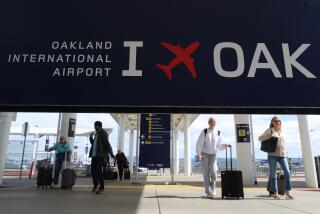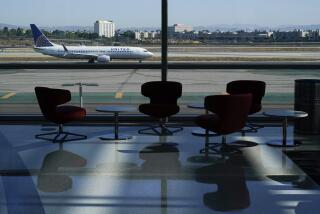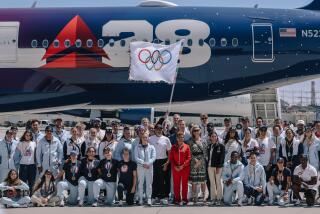Ontario officials get ownership of international airport and pledge more flights and services

After years of litigation and negotiation, Ontario officials assumed ownership of LA/Ontario International Airport from Los Angeles on Tuesday.
They say they hope to turn around the once fast-growing airport, which saw dramatic cuts in airline service and its annual passenger volume plunge from 7.2 million in 2007 to 3.97 million in 2013 during the economic downturn.
The transition from Los Angeles World Airports to the Ontario International Airport Authority became official after the authority paid off $55.5 million in bonds issued by Los Angeles for airport improvements and the Federal Aviation Administration issued an operating certificate to the authority, an independent government agency.
Last year, the number of air travelers rose to 4.2 million, a modest upward trend that has continued this year. The gains, however, lag behind the recoveries of similar airports around the country.
...The Inland Empire has been adding jobs during the economic recovery and. . . represents a large market...There’s a lot of potential.
— John Husing, economist for Inland Empire Economic Partnership
The transfer process began in August 2015, when a lawsuit brought by Ontario to gain control of the faltering airport was settled with Los Angeles.
The case, filed in 2013, alleged that mismanagement by Los Angeles World Airports triggered the facility’s loss of passengers and flights. Los Angeles contended that the severe recession prompted the decline in air travel and created an incentive for airlines to relocate service to major airports like LAX.
In the near future, Ontario officials say they will make improvements to terminals, signage, parking and concessions to enhance the passenger experience. To attract airline services, they plan to cut costs by streamlining operations and eliminating the high administrative fees Los Angeles World Airports used to charge the airport.
The formula could lead to lower fares for travelers, a greater variety of airlines to choose from and more nonstop flights to major destinations. Authority officials said they are already targeting markets on the East Coast and meeting with airlines, including Chinese carriers.
“We will be aggressive on air service development,” said Kelly Fredericks, the authority’s chief executive. “We are looking at a whole host of international and domestic markets, cargo operations as well as charter and private jet operations for business travelers.”
Southwest Airlines, the large discount carrier, announced that it will begin nonstop service Jan. 15 from Ontario to Love Field in Dallas, officials said.
The trick is getting airlines to invest in Ontario. That is pretty hard.
— Jack Keady, airport consultant
Aviation and economic consultants say the recovery will take time and the Ontario authority still faces substantial hurdles to revive the facility, which earned a Forbes magazine nod years ago as one of the nation’s top “alternative airports.”
“The trick is getting airlines to invest in Ontario. That is pretty hard,” said Jack Keady, an aviation and airport consultant in Playa del Rey. “You won’t get many international flights, and the airport lacks first-class and business-class customers that provide a substantial amount of profit. What are you going to do? You need to make a big pitch to get the discount carriers and establish a reputation as an airport with low fares.”
Ontario also will have to compete with LAX, which provides travelers a large number of airlines, low fares and far more nonstop flights to a wide selection of domestic and international destinations.
John Husing, an economic consultant and chief economist for the Inland Empire Economic Partnership, a group of major employers in Riverside and San Bernardino counties, expressed optimism for a full recovery, though it will take time.
Husing said Ontario officials are in a better position than Los Angeles World Airports to cut operating costs and they can resume advertising and marketing, which was virtually eliminated during the recession.
He noted that the facility, which might be able to handle 15 million to 30 million passengers a year, has an enormous amount of undeveloped land. If used to expand aviation services and cargo operations, it could dramatically increase airport revenue, he said.
The airport also needs to lure more business travelers, Husing said. “But the Inland Empire has been adding jobs during the economic recovery and its population of about 4.5 million people — more than the state of Oregon — represents a large market.”
Los Angeles Mayor Eric Garcetti, FAA Administrator Michael Huerta and members of Congress, including Sen. Dianne Feinstein (D-Calif.), are scheduled to attend a formal ceremony on Wednesday in Ontario.
To read the article in Spanish, click here
ALSO
McLaren sports car crashes in Woodland Hills; two cars flee the scene
L.A. City Council approves Frank Gehry’s project on the Sunset Strip
Utility wants to resume pumping natural gas into Aliso Canyon facility that was site of massive leak
More to Read
Sign up for Essential California
The most important California stories and recommendations in your inbox every morning.
You may occasionally receive promotional content from the Los Angeles Times.











